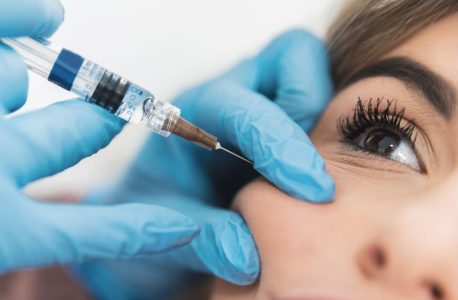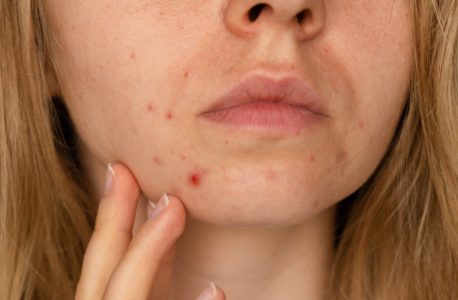Hair loss in women is a fairly common but often overlooked problem. Although it’s normal to lose a few strands every day, excessive hair loss can be a cause for concern.
In this article, we’ll explore the most effective treatments available, including Hair PRP, Hair Mesotherapy and, for more advanced cases of hair loss, hair transplantation.
Causes of hair loss in women
Understanding the cause of female hair loss is crucial to choosing the most appropriate treatment.
First of all, it is essential to differentiate between the type of hair loss the patient has. It could be diffuse hair loss, known as telogen effluvium, in which the patient notices that more hair is falling out when she combs or washes her hair. It may also be the case of a decrease in hair density, in which there is greater visualization of the scalp, with widening of the parting of the hair, a condition characteristic of androgenetic alopecia. These symptoms often occur simultaneously, often due to a combination of causes that lead to hair loss.
Hair loss in women can have various causes. Genetic factors (androgenetic alopecia), hormonal imbalances (such as those caused by the menopause, pregnancy or hypothyroidism), stress and certain medications are among the most common causes.
Hair loss itself, telogen effluvium, can often be caused by either a deficiency or excess of vitamins and minerals. Generally, a shortage of B vitamins, vitamin C and vitamin D, as well as insufficient magnesium, iron and zinc, can contribute to hair loss. Therefore, a balanced diet rich in these nutrients is also a way of preventing hair loss based on these causes.
Sometimes, over-consumption of supplements can also have the opposite effect. Although supplements are often used to help with hair growth and health, taking too much can lead to adverse effects. This can happen, for example, due to the toxicity of certain vitamins in excess in the body or due to an imbalance of nutrients (for example, too much vitamin E can reduce the absorption of other nutrients essential to hair health).
Many drugs can have the side effect of hair loss. Among the most common are some classes of antihypertensive drugs, chemotherapy drugs used to treat cancer, anticoagulants, antidepressants, among others.
It’s important to mention that there are also cases of localized hair loss, such as alopecia areata, and other autoimmune diseases that affect the scalp. In these cases, early and assertive diagnosis is crucial for successful treatment. That’s why a specialized medical assessment should always be the starting point when treating hair loss.
Psychological and emotional impact
Hair loss can have a significant impact on women’s self-esteem and mental health. Hair is often seen as a symbol of femininity and beauty, and its loss can lead to feelings of anxiety and depression.
At Living Clinic, as well as helping to treat the problem directly through innovative and very effective treatments, you can also, if you are interested, count on the support of a psychologist, who can help you deal with the condition and propose strategies for coping with emotional stress and developing a more positive self-image.
Treatments for female hair loss
When it comes to combating hair loss, there are effective treatments that have shown promise for a wide variety of causes associated with this problem.
The patient is given a comprehensive assessment by the Living Clinic dermatologist. A physical and trichoscopy examination of the scalp and hair is carried out, as well as a complete anamnesis before any treatment is proposed. The main treatments for hair loss or loss of hair density are:
- Drug treatment
- Hair mesotherapy
- Hair PRP
- Hair transplantation (for more advanced cases)
Drug treatment is often the first choice in initial cases of hair loss. However, in more advanced cases of alopecia or when faster results are required, the combination of mesotherapy and hair PRP in the therapeutic plan is very effective. Mesotherapy can be carried out with nutrients and/or drugs. Because they are injected directly into the scalp, they have the great advantage of using lower doses of medication, which dramatically reduces the risk of systemic adverse effects. PRP, on the other hand, as it is made from the patient’s own blood, is a natural and effective therapy for stimulating scalp regeneration and hair growth.
The main difference between non-surgical treatments, such as Hair Mesotherapy and PRP, and Hair Transplantation lies in the nature and intensity of the procedures. While Mesotherapy and PRP are minimally invasive treatments aimed at stimulating hair growth and strengthening existing follicles through injections of nutrients or platelet-rich plasma, Hair Transplantation is a more complex surgical procedure aimed at cases of advanced baldness. In transplantation, hair follicles are physically removed from an area of the scalp and transplanted into the bald areas, offering a more permanent and direct solution to hair restoration.
The main benefits of Capillary Mesotherapy and Capillary PRP include:
- Increased blood supply;
- Revitalization of hair follicles;
- Induction of accelerated hair growth;
- Increased hair thickness and density;
- Moisturizing the scalp;
- Prevention of premature hair loss.
- Recovery of tissues and follicles after hair transplantation, as well as accelerated healing of the donor and recipient areas.
PRP and Hair Mesotherapy can be useful in both the treatment and prevention of hair loss and can be particularly beneficial in women with the following characteristics:
- Women with androgenetic alopecia (baldness);
- Women with plaque alopecia areata (an autoimmune dermatological disease);
- New mothers with postpartum hair loss;
- Women who have had a hair transplant and wish to enhance the results of the procedure, as well as promote healing and improve the survival rate of the grafts;
- Women with telogen effluvium of various causes.
Hair Mesotherapy Treatment
Hair Mesotherapy is usually the first minimally invasive approach to treating baldness and hair loss.
It is a medical treatment that consists of infiltrating the patient’s scalp with a compound that will vary depending on the diagnosis. It can be based on medication, nutrients such as vitamins and amino acids, and/or exosomes that stimulate hair strengthening and growth.
Find out more in Hair Mesotherapy.
Treatment with Capillary PRP
Capillary PRP (or Platelet Rich Plasma) is a non-invasive procedure in which a small collection of the patient’s blood is centrifuged in order to separate the plasma from the rest of the blood. Once the platelet-rich portion of the plasma has been obtained, it is injected into the patient’s scalp. This allows growth factors to be released into the dermis, which will boost hair growth and strengthening.
Find out more at PRP Capilar.
Hair Transplantation in Women
As mentioned above, hair transplantation is a type of microsurgery that removes follicles from places where hair is abundant (donor zone) and places them in places where hair is lacking (recipient zone).
The most widely used technique in hair transplantation, the FUE (Follicular Unit Extraction) technique, is a minimally invasive, painless form of hair transplantation that allows for a quick recovery with excellent results, without noticeable scars. With FUE technology, follicular units are extracted individually and then reimplanted in the areas where hair density is to be restored, follicle by follicle exactly as they are born on the scalp.
One of Living Clinic’s great advantages is that the professionals who carry out female hair transplants are able to do so without the patient having to shave all of her hair.
Many patients confuse hair transplantation with hair implantation, simply because they are unfamiliar with the process. In contrast to transplantation, hair implantation involves the simple placement of artificial hairs that will never grow. If one of these synthetic hairs falls out or is pulled out, the only solution is to replace it with new synthetic hair. There is also the chance that the implanted artificial hair will be rejected or cause scalp infections.
At the Living Clinic, we don’t do hair implants (only transplants).
Find out more about hair transplants.
Which professionals carry out the treatments?
All procedures are carried out by doctors who are specialized and experienced in this type of hair treatment. In the case of Living Clinic, this is the dermatologist who specializes in trichology (the area of medicine dedicated to hair health).
Book an appointment
If the health of your hair is a concern, schedule an appointment to clarify all your doubts and understand which treatment is best suited to your particular case.
Responsible for Hair Treatments

Dr. Paola Halfeld is a specialist in Dermatology from the Brazilian Medical Association and holds a Master in Public Health from the University of Porto. She completed her degree in Medicine at Estácio de Sá University in Rio de Janeiro. Subsequently, she completed her integrated master’s degree in medicine at the University of Algarve, registering with the Portuguese Medical Society in 2020.
She is a member of the Brazilian Society of Dermatology and a member of the European Academy of Dermatology and Venereology.
During her training, she completed internships at leading institutions such as the Oswaldo Cruz Foundation (Fiocruz) and the National Cancer Institute (INCA). She was a fellow in aesthetic dermatology and trichology (an area of dermatology that studies and treats hair disorders).
Dr. Halfeld is a regular participant in medical conferences and events, contributing to scientific communications as main author and co-author, in addition to numerous courses and training courses in many areas of dermatology. She recently presented her master’s study at the World Congress of Dermatology in Singapore.
Dr. Halfeld has a special interest in the treatment of diseases affecting the scalp and hair and in cosmetic dermatology. It is her practice to perform a complete physical examination for skin cancer screening in all her patients.
Schedule an Appointment
- Are you looking for more information about a specific treatment?
- Would you like to learn more about Living Clinic?
- Would you like to receive the opinion of our specialists?
- Are you interested in scheduling a consultation?






